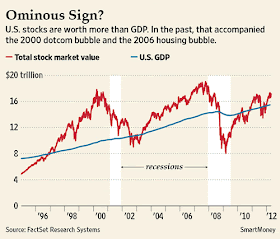SAC Capital is under investigation for insider trading. A securities analyst has been accused of leaking secret information about a potential partnership between Yahoo and Microsoft. People are upset because insider trading gives an unfair advantage to traders who cheat and this seems an indictment of the larger system. But that is not an indictment of the larger system.
The big question is not whether there is cheating and insider trading. That's the little question. The big question is whether capital markets are set up to best create long-term wealth, whether capital still drives economic growth. For all the talk of capitalism, that's no longer so clear.
Oddly, the movement of equity markets seems to have little to do with the movement of GDP. One might imagine that as equity prices are bid up, there is more incentive to create equity, to start businesses, and that GDP growth would follow a rise in the stock market. As it is, though, rallies that seemingly rest on the assumption that the economy is about to take off merely bust. The stock market goes up faster than average but the economy does not follow, as you can see in this graph from Market Watch.
If capital markets did a better job of creating equity rather than just pricing it, you might GDP go up in response to a rise in market capitalization. But this doesn't happen. As you can see in this graph on the right, GDP grows at a fairly steady pace while the market leaps about it like a hyper kid. As we were reminded by the Financial Crash of the late aughts, equity markets rising can actually trigger the reverse, as burst bubbles actually create a recession.
To me, this points to a failure of entrepreneurship. Capital markets are plenty powerful to provide trillions in debt or equity financing. This chart suggests that capital is more often used to price (often incorrectly) equities than create them. All that money chases value; little of it creates values. I would argue that this is because entrepreneurship is the limit in today's economy, not capital. There is more money available to invest than there are plausible ventures in which to invest.
It would be interesting to have some sort of equity tax, requiring investors to set aside a percentage of their investments to finance public and private sector startups, forcing more money directly into entrepreneurial ventures. This might raise the probability that as investments go up, a percentage is actually creating the next GM, IBM, or Microsoft rather than just changing the price of the old GM, IBM, or Microsoft. The problem of failing to create wealth or jobs does not point to a shortage of capital. Rather, it points to a shortage of entrepreneurship. Any policy that would do more to stimulate entrepreneurship would make capital markets more effective. After all, if capital markets aren't creating wealth, it hardly makes a difference to the economy whether or not some people are unfairly getting information in advance of the market; to move early on a market that's only keeping pace with GDP growth rather than driving it confers little advantage.
If markets were forced to funnel more capital into startups, this could easily create a bubble there. If entrepreneurship really is the limit, it suggests that much of the capital invested in creating a new generation of entrepreneurs would - short turn - be wasted. But a wave of investment financing that had to go into startups would do at least two things. One, it would entice existing corporations to structure to make themselves more entrepreneurial, spinning off ventures that could become stand alone entities. Two, it would create a generation of entrepreneurs who might have otherwise stayed in middle management, an initiative akin to the GI Bill that turned thousands - perhaps millions - of returning WWII veterans who would have otherwise worked in shops or on farms into college students who became doctors, lawyers, professors, engineers, and scientists. People who would not have otherwise become white-collar professionals did, and incomes rose.
It is time to take seriously the fact that in the West, capital markets are no longer creating wealth and jobs at the rate they once did. The limit to progress has shifted and until policy changes to reflect that, capital markets are as likely to create bubbles as jobs or a general rise in income. Studies suggest that about 100% of the rise in income coming out of the recession went to the top 1%. The problem is not that the rich are getting richer. The problem is that no one else is.
Bernanke has done a fairly heroic job of stimulating the economy without any assistance from Congress, but his monetary policy seems to inadequately funnel money into the markets for startups where it can actually create jobs. In the last year, banks reserve balance requirements - the amount they are required to hold idle to offset loans and investments - rose by nearly $13 billion, from $51B to $63B. The amount they actually held in reserve, however, was wildly in excess of that: in the last year it has risen by about $500 billion, from $1.5 trillion to $2 trillion. As it now stands, money pushed into the system can - and does - sit idle. A startup fund could change that.
Capital markets could create widespread wealth and jobs far more effectively. Going after cheaters won't change that. Establishing up a startup tax could.



No comments:
Post a Comment